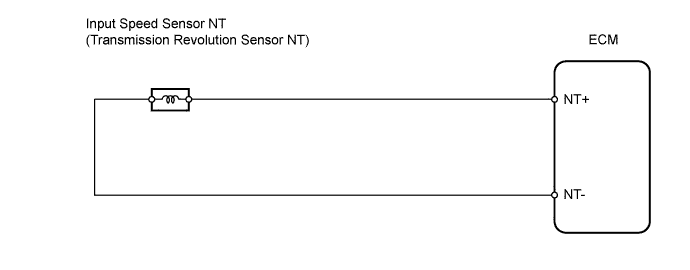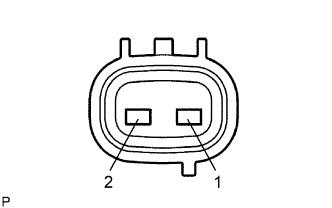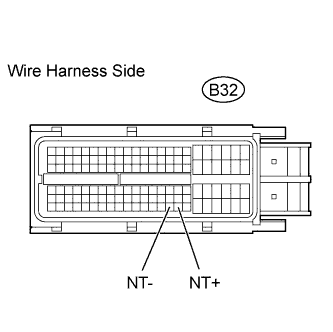Dtc P0717 Input Speed Sensor Circuit No Signal
DESCRIPTION
MONITOR DESCRIPTION
WIRING DIAGRAM
INSPECTION PROCEDURE
INSPECT SPEED SENSOR (INSTALLATION)
INSPECT SPEED SENSOR NT
CHECK WIRE HARNESS (SPEED SENSOR - ECM)
DTC P0717 Input Speed Sensor Circuit No Signal |
DESCRIPTION
This sensor detects the rotation speed of the turbine, which shows the input revolution of the transaxle. By comparing the input speed signal (NT) with the counter gear speed sensor signal (NC), the ECM detects the shift timing of the gears and controls the engine torque and hydraulic pressure according to various conditions. As a result, smooth gear shifting is achieved.DTC No.
| DTC Detection Condition
| Trouble Area
|
P0717
| ECM detects conditions (a), (b) and (c) continuously for 5 sec. or more (1 trip detection logic):
(a) Vehicle speed: 50 km/h (31 mph) or more
(b) Park/Neutral position switch (NSW, R and L) is OFF
(c) Speed sensor NT: Less than 300 rpm
| - Open or short in speed sensor NT circuit
- Speed sensor NT
- ECM
|
MONITOR DESCRIPTION
This DTC indicates that a pulse is not output from the speed sensor NT (input speed sensor) or is output only a little. The NT terminal of the ECM detects the revolving signal from the speed sensor (NT) (input RPM). The ECM outputs a gear shift signal comparing the input speed sensor (NT) with the output speed sensor (NC).While the vehicle is operating in the 2nd, 3rd or O/D gear position with the shift lever on D, if the input shaft revolution is less than 300 rpm*1 and the output shaft revolution is 1,000 rpm or more*2, the ECM detects the trouble, illuminates the MIL and stores the DTC.- HINT:
- *1: Pulse is not output or is irregularly output.
- *2: The vehicle speed is approximately 50 km/h (31 mph) or more.
WIRING DIAGRAM
INSPECTION PROCEDURE
- HINT:
- Using the intelligent tester's Data List allows switch, sensor, actuator and other item values to be read without removing any parts. Reading the Data List early in troubleshooting is one way to save time.
- NOTICE:
- In the table below, the values listed under "Normal Condition" are reference values. Do not depend solely on these reference values when deciding whether a part is faulty or not.
- Warm up the engine.
- Turn the ignition switch off.
- Connect the intelligent tester to the DLC3.
- Turn the ignition switch on (IG) and turn the tester ON.
- Enter the following menus: Powertrain / Engine and ECT / Data List.
- Follow the instructions on the tester and read the Data List.
Item
| Measurement Item/
Range (Display)
| Normal Condition
| Diagnostic Note
|
SPD (NT)
| Input turbine speed/
Min.: 0 rpm
Max.: 12,750 rpm
| - Lock-up ON (after warming up engine):
Input turbine speed (NT) equal to engine speed.
- Lock-up OFF (idling with shift lever on N):
Input turbine speed (NT) is nearly equal to engine speed.
| Data is displayed in increments of 50 rpm
|
- HINT:
- SPD (NT) is always 0 rpm while driving:
Open or short in the sensor or circuit.
- SPD (NT) is always more than 0 rpm and less than 300 rpm while driving the vehicle at 50 km/h (31 mph) or more:
Sensor trouble, improper installation, or intermittent connection trouble of the circuit.
| 1.INSPECT SPEED SENSOR (INSTALLATION) |
Check the speed sensor NT installation.
- OK:
- Installation bolt is tightened properly and there is no clearance between the sensor and transaxle case.
| 2.INSPECT SPEED SENSOR NT |
Disconnect the B30 sensor connector from the transaxle.
Measure the resistance of the sensor.
- Standard resistance:
Tester Connection
| Condition
| Specified Condition
|
1 - 2
| 20°C (68°F)
| 560 to 680 Ω
|
| 3.CHECK WIRE HARNESS (SPEED SENSOR - ECM) |
Connect the speed sensor connector.
Disconnect the B32 ECM connector.
Measure the resistance of the wire harness side connector.
- Standard resistance:
Tester Connection
| Condition
| Specified Condition
|
B32-125 (NT+) - B32-124 (NT-)
| 20°C (68°F)
| 560 to 680 Ω
|
B32-125 (NT+) - Body ground
| 20°C (68°F)
| 10 kΩ or higher
|
B32-124 (NT-) - Body ground
| 20°C (68°F)
| 10 kΩ or higher
|
| | REPAIR OR REPLACE HARNESS AND CONNECTOR |
|
|



